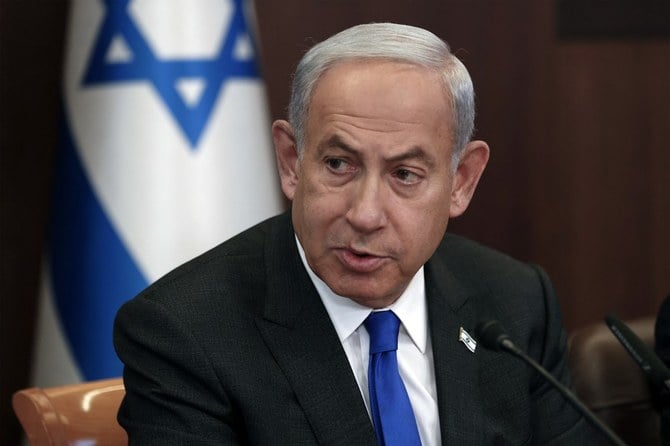
Israel has now sworn in its most right-wing government ever. The current government bluntly states its goal of expanding settlements, which is in direct contradiction of international law and kills off any prospect of a two-state solution. How should the world deal with such a government?
The Biden administration in the US ironically says it is looking forward to working with Prime Minister Benjamin Netanyahu on promoting “regional peace.” The White House either naively or sarcastically issued a statement saying: “The United States will continue to support the two-state solution and to oppose policies that endanger its viability or contradict our mutual interests and values.”
At the same time, the first item in the Netanyahu government’s list of basic principles states that it will work on expanding settlements in the West Bank. It says that “the Jewish people have exclusive and indisputable rights” over the entirety of Israel and the Occupied Territories and that “the government will promote and develop the settlement of all parts of the land of Israel — in the Galilee, the Negev, the Golan and Judea and Samaria,” referring to the West Bank.
In parallel, this government rejected last week’s vote by the UN General Assembly that asks the International Court of Justice for an opinion on the legal consequences of Israel’s occupation of the Palestinian territories. The Israeli ambassador to the UN called it a “morally bankrupt and politicized” organization and described the West Bank as being the Jewish people’s “homeland.” Netanyahu also made a defiant statement saying that the UN vote does not bind Israel.
Netanyahu cannot increase settlements and fragment what should be a Palestinian state while sweet-talking the US and the world
Dr. Dania Koleilat Khatib
In December, the UN adopted a resolution through which it acknowledged the Palestinians’ right to self-determination, hence recognizing their peoplehood. The resolution received 167 votes in favor, while just Israel, the US and four other countries including Micronesia opposed it. Hence, international pressure is increasing on Israel, while the Netanyahu government is more defiant of international law than ever.
Reasonable people know how dangerous the current government is as it pushes to create irreversible realities on the ground that would hermetically block any path to peace between the Israelis and the Palestinians. The Biden administration, which has so many challenges on the foreign policy front, will probably not be willing to open a new front with Netanyahu and his government. As for the Arab countries that normalized relations with Israel, it is unlikely they will have any leverage with the new government. In fact, Itamar Ben-Gvir, after meeting with the Emirati ambassador, defiantly bragged that Israel can make peace with countries in the region “without concessions.” Also, there are signals that the countries that have normalized with Israel are ready to deal with whatever government the Israeli people choose.
On the other hand, many American Jews are very upset with the new government. Three-quarters of the Jewish community in the US are Democratic-leaning and are appalled by Netanyahu’s coalition. The rift between American Jewry and Israel is widening. Avi Maoz, who is in the new Cabinet and is in charge of “Jewish identity,” has been very critical of the Reform Judaism movement, which comprises a third of American Jews and is the country’s largest denomination. It is too early to speak of a break, but the relationship between Israel and American Jews, which is fundamental for Tel Aviv, is now rocky. This is because American Jews see Israel transforming into an entity that does not represent them.
The goals of the new government are a disaster for the Palestinians, the region and Israel itself. Already, the number of killings in the West Bank is increasing. An increase in the building of settlements will require more evictions. The principles of the Netanyahu government also include the Negev, which will galvanize the desert’s Bedouins.
Some researchers say that such principles are not binding and that they hope Netanyahu will take a more “moderate” course. However, those hypotheses belong to the realm of wishful thinking, as Netanyahu cannot afford to upset the members of his government. If Maoz, Ben-Gvir and Bezalel Smotrich exit the Cabinet, Netanyahu might find himself in prison over his corruption cases. Those who have followed Netanyahu’s career know that he is a political animal and his survival comes before anything else. He will not allow this government to collapse and for him to be left wearing an orange outfit.
So far, the government is trying to play on the gray areas. Netanyahu wants to please his right-wing allies while giving the world fake assurances. However, there should be more and more pressure on him to come clean. He cannot increase settlements and fragment what should be a Palestinian state while sweet-talking the US and the world. Here, there should be pressure on Israel to define its boundaries.
Since Israel does not recognize a Palestinian state and is still expanding, it does not define its own boundaries. Arab countries, especially those surrounding Israel, should push for a UN resolution asking Tel Aviv to define its borders. This is a reasonable demand as countries define their borders and register them with the UN. To achieve this, Arab countries should liaise with American Jewry, which wants to save Israel from itself.
Lebanon has an important role to play in this resolution. Last year’s maritime demarcation agreement between Lebanon and Israel should be a driver for such an action. This will also push Israel to define its land borders with Lebanon and hence clarify its stance on the Shebaa Farms area, which is a point of contention between the two countries.
In a nutshell, the pressure on Israel should continue and, in this respect, pushing it to define its borders at the UN would be the best next step.
Dr. Dania Koleilat Khatib is a specialist in US-Arab relations with a focus on lobbying. She is president of the Research Center for Cooperation and Peace Building, a Lebanese nongovernmental organization focused on Track II.











